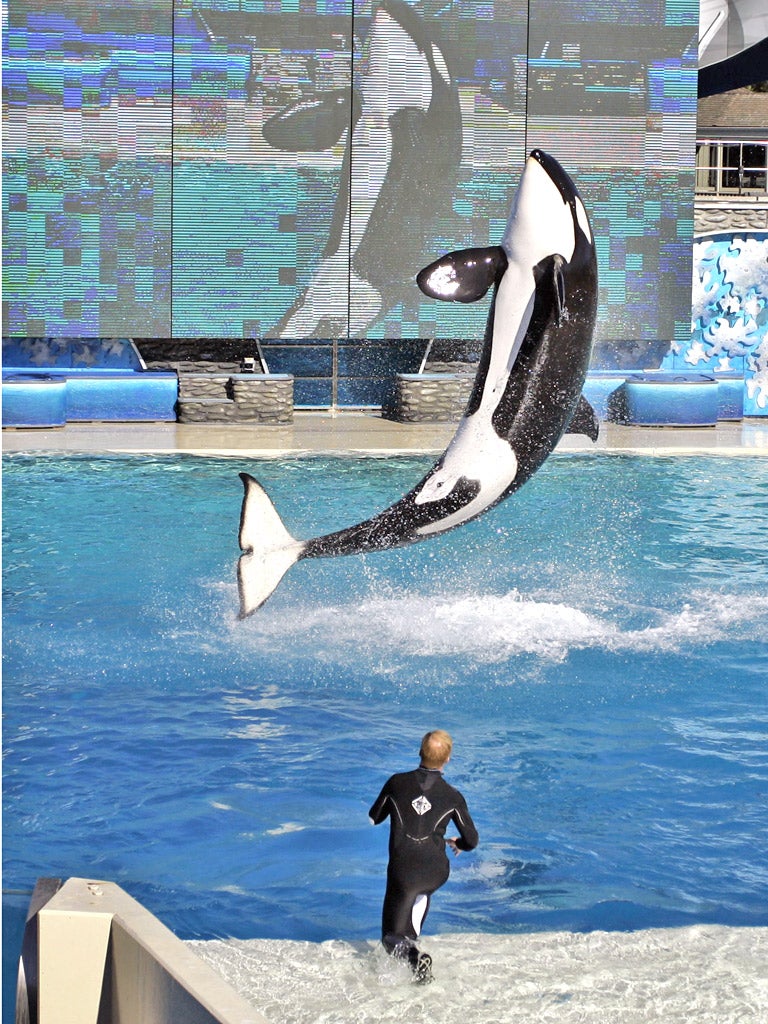Free Willy - his rights under the US constitution are being violated
PETA says that park has violated provision banning slavery in the United States

In a wild legal leap, PETA, the group that campaigns against cruelty to animals, is asking a judge to order the release of five orca whales owned by SeaWorld on the grounds that they are being enslaved in violation of the 13th Amendment to the US Constitution.
The lawsuit, which was to be filed with the US District Court in San Diego yesterday, is the most audacious attempt by People for the Ethical Treatment of Animals to shame SeaWorld into surrendering its cast of whales – Tilikum, Katina, Corky, Kasatka and Ulises – which perform several times daily at theme parks in Florida and California.
It is a bold step because it implies that the 13th Amendment, which was adopted to outlaw human slavery in the United States after the Civil War, should be extended also to animals, a notion that some might find insulting. However, the PETA legal team, headed by Jeff Kerr, said it spent 18 months preparing the suit. There is nothing in the Amendment, the group notes, that explicitly limits its scope to humans.
"By any definition, these orcas are slaves – kidnapped from their homes, kept confined, denied everything that's natural to them and forced to perform tricks for SeaWorld's profit," said Mr Kerr. "The males have their sperm collected, the females are artificially inseminated and forced to bear young which are sometimes shipped away."
SeaWorld insists that by bringing large numbers of tourists to their facilities it is raising public awareness of the ocean habitat and of the lives of whales. Indeed under US laws, permits for performing animal shows are only extended where there is a substantial conservation element involved.
The company suffered its worst public relations setback early last year when Tilikum, a five-tonne male orca captured off the coast of Iceland 30 years ago, attacked a female trainer and dragged her under water in one of the SeaWorld pools until she drowned. The tragedy came at the end of a performance with the audience watching.
Calling the lawsuit baseless and "in many ways offensive", SeaWorld said in a statement that it was "among the world's most respected zoological institutions". It added: "There is no higher priority than the welfare of the animals entrusted to our care and no facility sets higher standards in husbandry, veterinary care and enrichment."
The animal rights group has over the years launched a series of attention-grabbing stunts, notably to shame the purveyors and wearers of fur coats as well as the meat industry. It is perfectly capable of taking steps that might seem quixotic but which will at the very least garner wide public attention.
That said, a debate about possibly extending animals rights that would mean them becoming more than just the property of humans has already begun in some law departments in the US. The chances of the court admitting the suit might be slim, however. Law professor David Favre, of Michigan State University, who has explored creating a legal category called "living property" for some animals, is among the sceptics.
"The court will most likely not even get to the merits of the case, and find that the plaintiffs do not have standing to file the lawsuit at all," he said. "I also think a court would not be predisposed to open up that box with fully unknown consequences."
Join our commenting forum
Join thought-provoking conversations, follow other Independent readers and see their replies
Comments
Bookmark popover
Removed from bookmarks